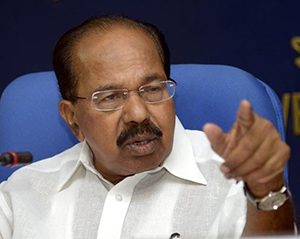Bengaluru, June 19: Blaming the adverse environment created by the BJP-led regime at the Centre for Reserve Bank of India (RBI) Governor Raghuram Rajan's decision to not continue with his current post after the end of his tenure in September, former union minister Veerappa Moily on Saturday hinted at the RSS being involved in the entire matter.
Moily criticised the saffron outfit for having embarrassed Rajan and said the latter was needed to steer the economy in times of global economic uncertainty.
"The reason is well known to him. But the manner in which some of these BJP leaders, including the commerce minister and one of the important BJP leaders Subramanian Swamy, and also the Nagpur RSS camp was lobbying against him, was the most unpleasant thing that happened in the country," Moily told ANI.
The senior Congress leader further said the present regime did not deserve a person of Rajan's stature to be working with them.
"Under the present regime, they do not deserve a person of his stature. He is a global person. We are endowed to him, he took all steps to keep the inflation down. They shouldn't have embarrassed him. His desire not to continue was compelled because of environment created by the BJP regime," Moily said.
"Under the present (economic) scenario, he was very much desired as he would have definitely taken the economy forward. It's a loss for country's economy," he added.
BJP leader Subramanian Swamy had last month triggered speculation by asking the Centre to deny Rajan a second term, saying his hawkish policies have ruined the Indian economy.
Swamy had in his letter to Prime Minister Narendra Modi accused Rajan of 'harming the nation's economy' and claimed that the latter was acting more as a disrupter of the Indian economy than the person, who wants the Indian economy to improve.
Moily said that Prime Minister Narendra Modi or Finance Minister Arun Jaitley should have made an attempt to curb elements in the BJP levelling false allegations against Rajan, including Swamy.
"The Prime Minister or the Finance Minister should have curbed these elements who are unnecessarily making allegations and charges against Raghuram Rajan," he said.
When asked specifically about Swamy's remarks on Rajan, the senior Congress leader said, "Swamy's allegations are baseless and he doesn't know much about the economy. NDA is out to disrupt economy of the country."
Meanwhile, Swamy welcomed Rajan's decision to leave his post, saying he was not even going to be offered a second term in the first place.
Swamy told ANI that Rajan made this decision in order to save his self respect.
"Was he getting a second term in the first place? How do we know that he was getting a second term? I have no information that he was getting a second term. So if he says he wants to go and wants to save his self respect, I have no problem. Let them pretend that he is giving up and going but as long as he goes, it's good," Swamy said on Saturday.
Earlier today, Rajan announced that he would return to the academic world at the end of his term on September 4, 2016, adding he will always be available to serve his country when needed and asserted that his 'successor' would take the nation to new heights.
Rajan is currently on leave from the Chicago Booth School of Business where he holds the post of Distinguished Service Professor of Finance.
"The approaching end of my three-year term and of my leave at the University of Chicago was, therefore, a good time to reflect on how much we had accomplished. I am confident my successor will take us to new heights with your help. I will still be working with you for the next couple of months, but let me thank all of you in the RBI family in advance for your dedicated work and unflinching support. It has been a fantastic journey together!" the statement said.






Comments
Guys, Chaiwala is a PM... now he will obviously try to appease his colleagues - Dhoodwala, Subziwala, Golgappe wala, Kinarewala,...
and not to forget - PanWala (Rajnath Singh)
MMS - \#MoNa becoming PM will be the biggest disaster for the country\"
Now we know why and we will see more..!"
Add new comment